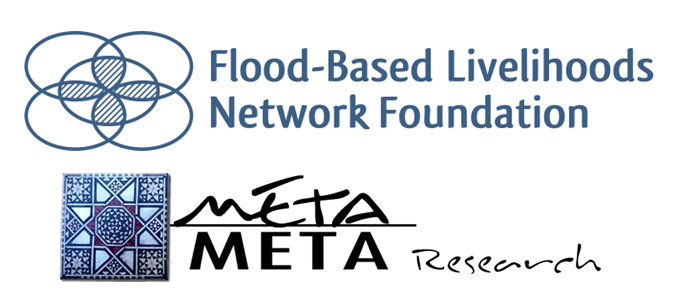Cover videos: livelihoods from floods in Pakistan
The FBLN Pakistan Chapter has recently produced a series of videos that show a variety of aspects related to flood-based livelihoods in the country. Learn about how farmers along Balochistan’s Narri River manage their floodwaters, and how government interventions have changed traditional water distribution rules and practices. Technology is altering the ways in which farmers work their land. One video shows the types of traditional and modern cultivation techniques that can be found in flood-based areas. The use of machines to drill small boreholes for household use is also making a huge difference to many. They can provide an alternative to the earthen reservoirs that are used to meet drinking water needs for both households and animals in many villages of Balochistan.
When it comes to crop cultivation, it is difficult for farmers in Pakistan to get a good price for traditional crops like sorghum, mung and moth beans. Therefore, the FBLN Pakistan Chapter is actively promoting better agronomic practices. After a farmer-to-farmer experience exchange, for example, Balochistan farmers agreed to start a chickpea trail, based on the lessons learnt from other provinces. More experimentation with new crops and varieties as well as inspiration to improve farming practices are two few of the outcomes of farmer-to-farmer exchange.
International training in flood-based farming
From August 7th to 15th, Mekelle University in Ethiopia organises its annual course on integrated watershed management and flood-based farming systems in arid and semi-arid areas of the Horn of Africa. The course aims to qualify professionals with a comprehensive understanding and technical skills in participatory approaches, watershed development and flood-based farming to enable participants to better plan, design and manage projects.
Farmers are obtaining seeds via FBLN WhatsApp
After an exposure visit to Sindh in early 2017, spate farmers from Balochistan requested the purchase of moth beans from Sindh at their own expense. Spate farmers from Tharparkar in Sindh were contacted to facilitate this request. Via the FBLN WhatsApp group, they shared pictures and rates of different types of seeds. The spate farmers from Balochistan created a joint pool, collected the money and have proceeded with the seeds procurement. Thanks to the social network provided by the FBLN Pakistan Chapter, numerous spate farmers in Balochistan now have access to better seeds.
New colleague supporting the FBLN
MetaMeta Research colleague Loes van der Pluijm has recently arrived in Nairobi where she will be based at the ICRAF office to support the Flood-Based Livelihood Network. For several months, she has already helped to organise the Internship Programme and Leadership Programme, with interns as well as country coordinators from several African and Asian countries coming to the Wageningen office for an intensive Flood-Based Livelihoods training. This has resulted in a smooth start, as she had the privilege to get to know many partners from the various project countries. Loes is now in close contact with the FBLN country coordinators and interns to support them and ensure a smooth implementation of the FBL projects. Loes: “I am really proud to be part of such an amazing network: it feels like one big family dedicated to improving the livelihoods of people in flood-based systems!”
Smart Agricultural Tools
Many agricultural tools improve labour productivity, reduce drudgery as well as occupational hazards. However, the wide distribution of useful tools for small-scale farmers often lags behind. MetaMeta and the Smart Centre Group re-develop and promote smart tools that have ample scope to stimulate inclusive growth. By demonstrating the tools and training the local private sector, the two partners aim to ensure the local production of these tools and set up adequate supply chains for high-quality and durable working tools for future generations.
@FBLN_media
FBLN is now sharing FBL news and facts on Twitter. Follow us to find out what is happening around the world to strengthen livelihoods in floodplains. Use the hashtag #FBLN to get your flood-based livelihoods-related message retweeted and spread throughout the FBL community of practice.
